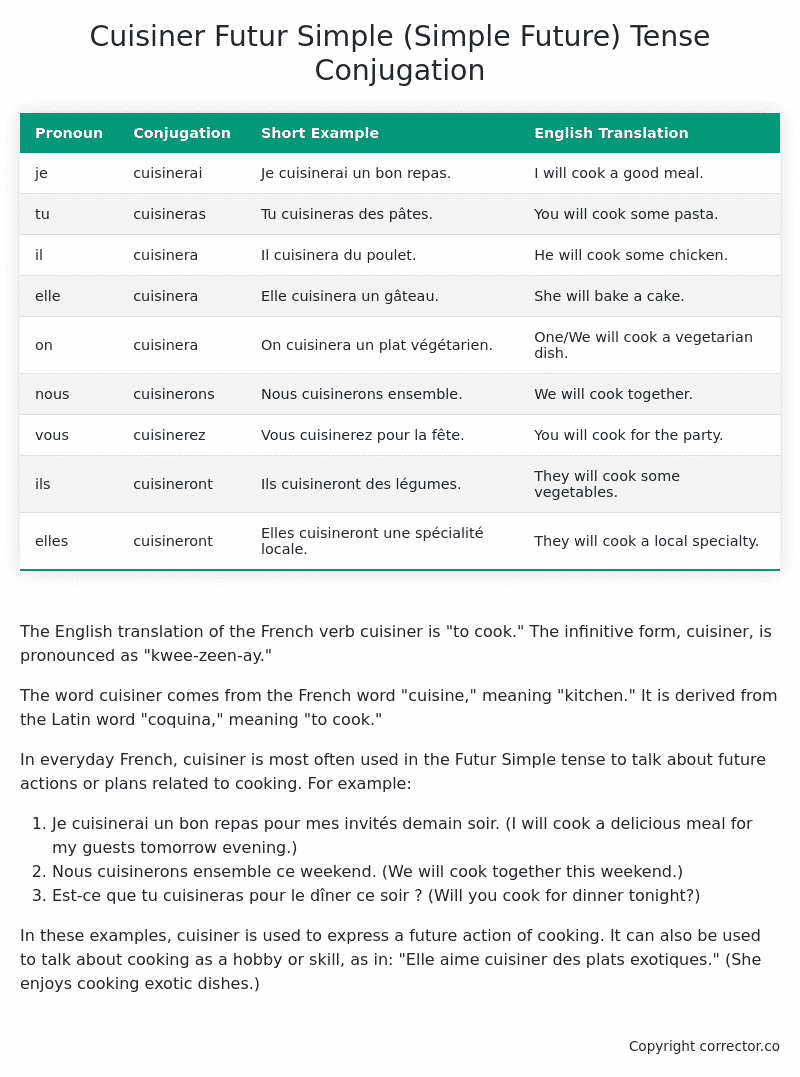Futur Simple (Simple Future) Tense Conjugation of the French Verb cuisiner
Introduction to the verb cuisiner
The English translation of the French verb cuisiner is “to cook.” The infinitive form, cuisiner, is pronounced as “kwee-zeen-ay.”
The word cuisiner comes from the French word “cuisine,” meaning “kitchen.” It is derived from the Latin word “coquina,” meaning “to cook.”
In everyday French, cuisiner is most often used in the Futur Simple tense to talk about future actions or plans related to cooking. For example:
- Je cuisinerai un bon repas pour mes invités demain soir. (I will cook a delicious meal for my guests tomorrow evening.)
- Nous cuisinerons ensemble ce weekend. (We will cook together this weekend.)
- Est-ce que tu cuisineras pour le dîner ce soir ? (Will you cook for dinner tonight?)
In these examples, cuisiner is used to express a future action of cooking. It can also be used to talk about cooking as a hobby or skill, as in: “Elle aime cuisiner des plats exotiques.” (She enjoys cooking exotic dishes.)
Table of the Futur Simple (Simple Future) Tense Conjugation of cuisiner
| Pronoun | Conjugation | Short Example | English Translation |
|---|---|---|---|
| je | cuisinerai | Je cuisinerai un bon repas. | I will cook a good meal. |
| tu | cuisineras | Tu cuisineras des pâtes. | You will cook some pasta. |
| il | cuisinera | Il cuisinera du poulet. | He will cook some chicken. |
| elle | cuisinera | Elle cuisinera un gâteau. | She will bake a cake. |
| on | cuisinera | On cuisinera un plat végétarien. | One/We will cook a vegetarian dish. |
| nous | cuisinerons | Nous cuisinerons ensemble. | We will cook together. |
| vous | cuisinerez | Vous cuisinerez pour la fête. | You will cook for the party. |
| ils | cuisineront | Ils cuisineront des légumes. | They will cook some vegetables. |
| elles | cuisineront | Elles cuisineront une spécialité locale. | They will cook a local specialty. |
Other Conjugations for Cuisiner.
Le Present (Present Tense) Conjugation of the French Verb cuisiner
Imparfait (Imperfect) Tense Conjugation of the French Verb cuisiner
Passé Simple (Simple Past) Tense Conjugation of the French Verb cuisiner
Passé Composé (Present Perfect) Tense Conjugation of the French Verb cuisiner
Futur Simple (Simple Future) Tense Conjugation of the French Verb cuisiner (this article)
Futur Proche (Near Future) Tense Conjugation of the French Verb cuisiner
Plus-que-parfait (Pluperfect) Tense Conjugation of the French Verb cuisiner
Passé Antérieur (Past Anterior) Tense Conjugation of the French Verb cuisiner
Futur Antérieur (Future Anterior) Tense Conjugation of the French Verb cuisiner
Subjonctif Présent (Subjunctive Present) Tense Conjugation of the French Verb cuisiner
Subjonctif Passé (Subjunctive Past) Tense Conjugation of the French Verb cuisiner
Subjonctif Imparfait (Subjunctive Imperfect) Tense Conjugation of the French Verb cuisiner
Subjonctif Plus-que-parfait (Subjunctive Pluperfect) Tense Conjugation of the French Verb cuisiner
Conditionnel Présent (Conditional Present) Tense Conjugation of the French Verb cuisiner
Conditionnel Passé (Conditional Past) Tense Conjugation of the French Verb cuisiner
L’impératif Présent (Imperative Present) Tense Conjugation of the French Verb cuisiner
L’infinitif Présent (Infinitive Present) Tense Conjugation of the French Verb cuisiner
Struggling with French verbs or the language in general? Why not use our free French Grammar Checker – no registration required!
Get a FREE Download Study Sheet of this Conjugation 🔥
Simply right click the image below, click “save image” and get your free reference for the cuisiner Futur Simple tense conjugation!

Cuisiner – About the French Futur Simple (Simple Future) Tense
Formation of Futur Simple
For regular -er verbs (e.g., parler – to speak)
For regular -ir verbs (e.g., finir – to finish)
For regular -re verbs (e.g., vendre – to sell)
Common Everyday Usage Patterns
Conditional Statements
Interactions with Other Tenses
Futur Antérieur
Conditional
Present
Summary
I hope you enjoyed this article on the verb cuisiner. Still in a learning mood? Check out another TOTALLY random French verb conjugation!


